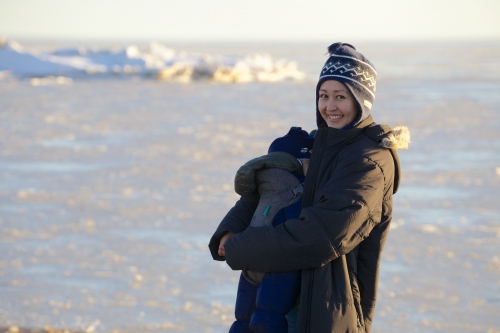
Olivia Lee is an Assistant Professor in the International Arctic Research Center (IARC) at the University of Alaska Fairbanks. Her research focuses on the integration of community observations and remote sensing imagery of sea ice to assess walrus and ice seal habitat in northern Alaska. She also works on participatory scenarios projects that aim to broaden our understanding of the socio-economic and biophysical drivers affecting the future of the Arctic. As the science lead for the Alaska Arctic Observatory and Knowledge Hub, she is working to build a coastal observing program that takes into account the interests of coastal communities in Arctic Alaska.
Olivia's involvement in Arctic research has primarily involved cross-disciplinary collaborations. As a co-lead for the Interagency Arctic Research Policy Committee (IARPC) Sea Ice Collaboration Team and a council member of the Association of Polar Early Career Scientists (APECS), she helps to promote greater collaborations to improve understanding and predictions of sea ice change, while supporting opportunities for greater engagement by early career researchers. She sees science communication as an important part of research, and encourages better communication about the importance of Arctic research at national and international levels. One important collaborative opportunity is the development of an Arctic Observing System, which is key to monitoring Arctic change, and would help provide a better system-level understanding of the connection between the Arctic and lower latitudes.
Olivia has served on the ARCUS Board of Directors since 2015. She sees ARCUS as invaluable for helping the Arctic research community coordinate activities to tackle broad system-level issues, such as an Arctic Observing System, and also regionally-relevant issues, through programs such as the Sea Ice for Walrus Outlook. ARCUS provides the infrastructure to access reports and information that keeps the state of knowledge up-to-date, and helps to ensure longevity and forward progress on issues. ARCUS has also supported communication and outreach of Arctic research through programs such as PolarTREC that help to make Arctic science more accessible to students and teachers. Olivia believes supporters of Arctic science can help support a broad range of issues by becoming ARCUS members.
